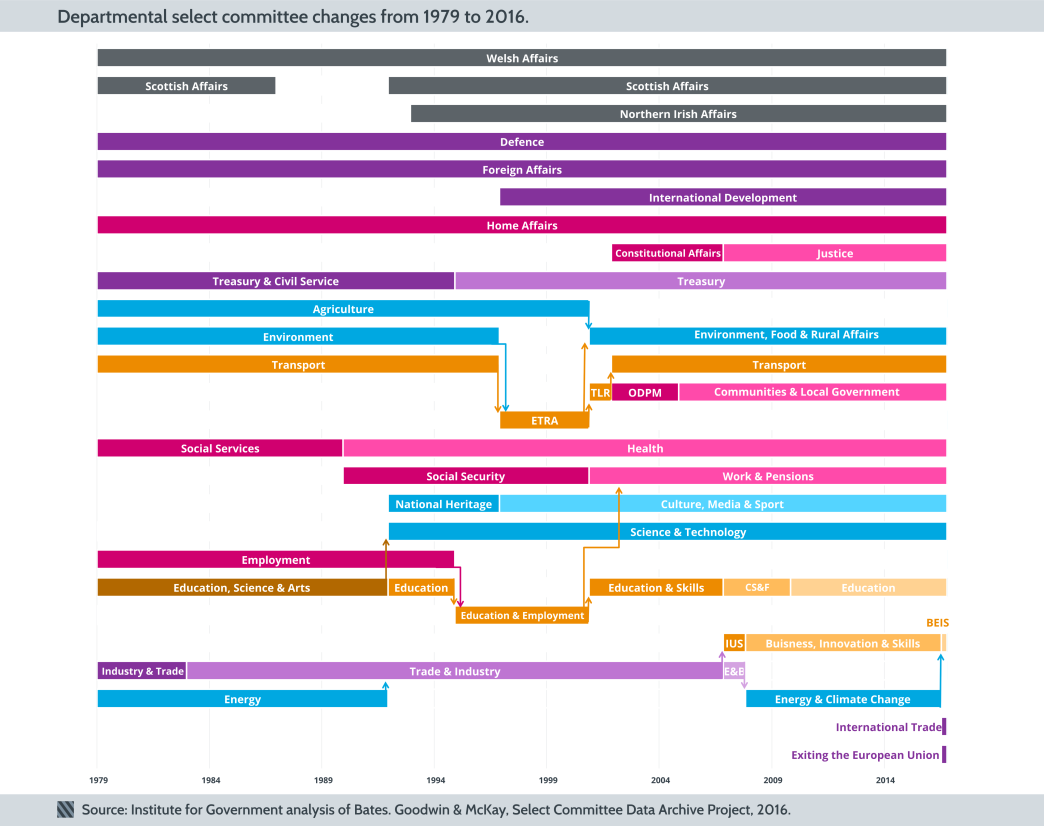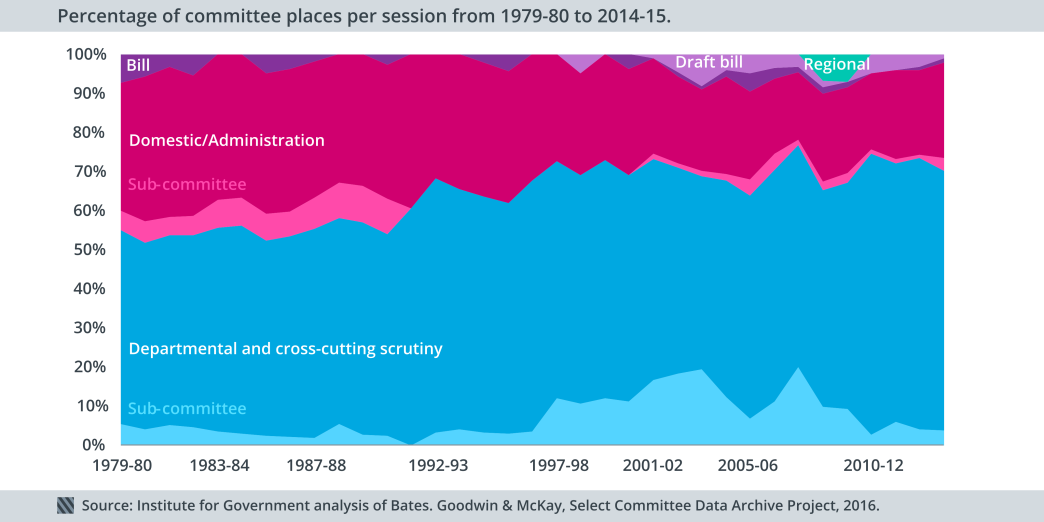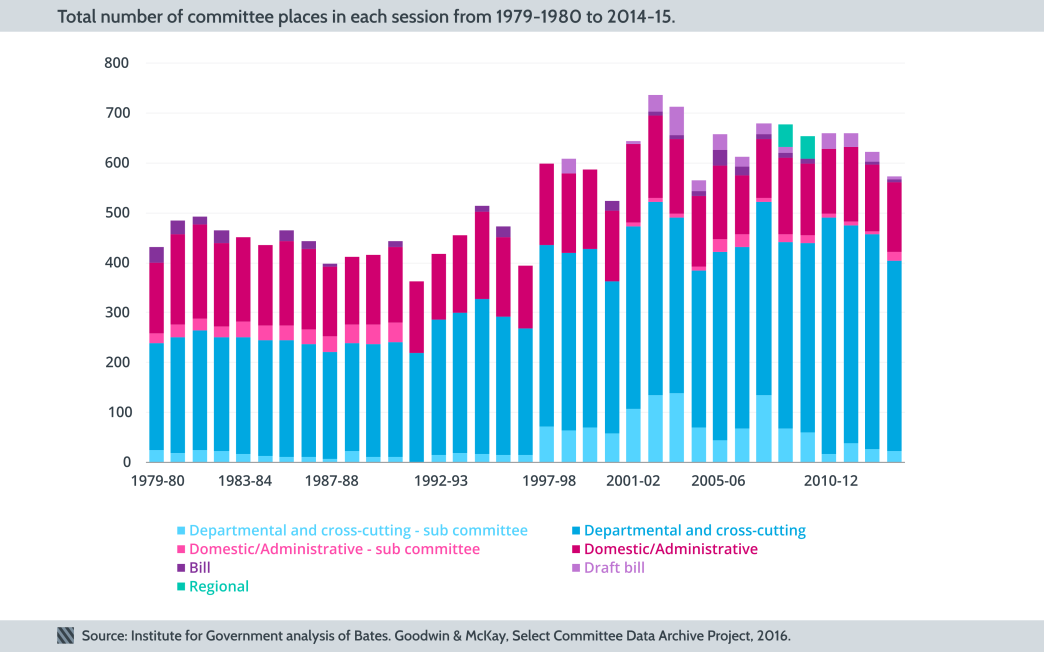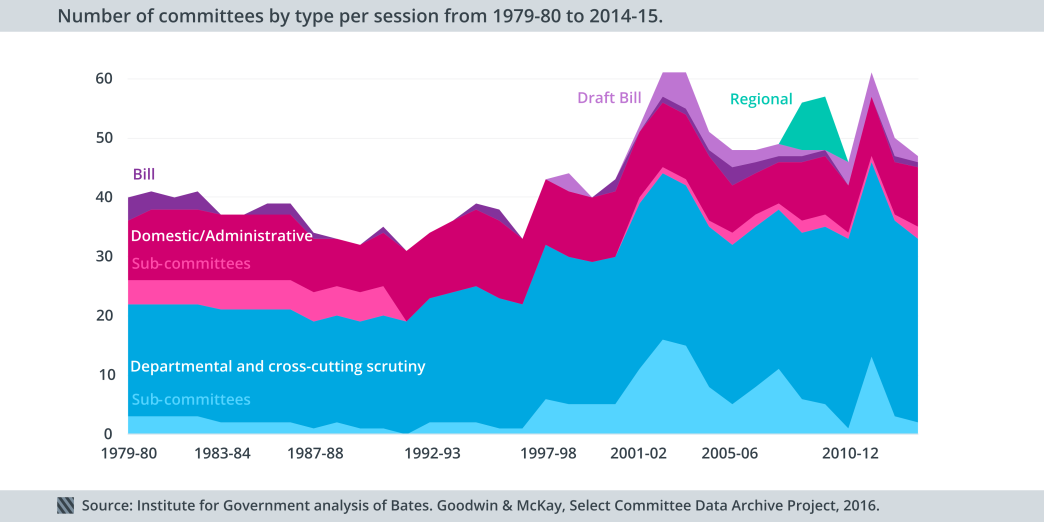Select committees are set to play a major role in parliamentary scrutiny of Brexit. Using data from the Select Committee Data Archive Project, Sophie Wilson finds that the number of select committees has risen since 1979 and looks at the impact of this growth on MPs’ time.
Commons committees have increased in number

Committees have been a longstanding feature of parliamentary activity, scrutinising the work and expenditure of government, debating legislation and considering procedural and administrative work of the House. In 1979, the current system of departmental select committees was created: cross-party groups of backbench MPs responsible for scrutinising the work of government departments. Since then, Parliament has witnessed a growth in the number of committees with the total number rising from 40 in 1979 to 47 in 2015. During this period, the number of committees peaked with more than 60 in 2002–04 and 2012–13. These peaks reflect the creation of large numbers of sub-committees, including the ten ‘panels’ set up by the joint Commons and Lords Parliamentary Commission on Banking Standards.
The opportunities for MPs to sit on committees have likewise risen

Unsurprisingly, as the number of committees has risen, so has the number of opportunities for MPs to sit on them. By the end of the 2014–15 session, there were 141 more places for MPs on committees than in 1979, with a total of 573 available spots. This has been driven by an increase in the number of positions on departmental and cross-cutting select committees (from 19 committees in 1979 to 31 in 2015) with the total number of places on these sorts of committee rising by 78% between 1979 and 2015.
Although backbench MPs can and do sit on more than one committee (to sit on a sub-committee, an MP must already be a member of the main committee), the number of positions has risen significantly.
The proportion of time spent by MPs on committees on select committee work has increased

The number of MPs taking part in departmental and cross-cutting scrutiny has risen in both absolute and relative terms. By 2015, 70% of MPs sitting on committees were on departmental and cross-cutting select committees and their sub-committees. This contrasts with 55% of MPs on committees in 1979 and reflects a gradual rise in the number of departmental and cross-cutting committees between 1979 and 2015.
Over the same period, there has been an increase in the so-called ‘payroll vote’, the MPs who hold a position in government (for example, as ministers, whips or parliamentary private secretaries) and are therefore disqualified from serving on committees. 21% of MPs now form part of the payroll vote – an increase from 19% in 1979 – meaning that MPs who are eligible to sit on committees have a proportionally greater workload. While this provides a good opportunity to build parliamentary experience beyond the frontbench, there is a risk of overstretch. This could be exacerbated if proposed boundary changes reducing the number of MPs from 650 to 600 go ahead.
What does this mean for future parliamentary scrutiny?
Last year saw the creation of two new committees to scrutinise the Department for International Trade and the Department for Exiting the European Union, and the demise of the Energy and Climate Change Committee. These modifications mark the latest in a long line of changes to the departmental committee system made to reflect machinery of government changes, and mean a further increase in the burden of committee scrutiny undertaken by MPs.

Parliament faces two risks if the burden of committee work continues to increase, driven by a growth in the absolute number of committee places and a reduction in the number of MPs eligible to participate in scrutiny. One is the pressure this puts on the MPs involved, who may need greater support and resources to fulfil their role on a committee. The other is a possible decline in the effectiveness of scrutiny if those MPs, facing many other calls on their limited time, are unable to devote sufficient attention to their scrutiny role.
Given the important work committees will need to undertake on Brexit, both the Government and Parliament need to consider how to avoid either risk materialising.
This analysis is based on data provided by Stephen Bates (University of Birmingham), Mark Goodwin (University of Birmingham) and Steve McKay (University of Lincoln), as part of their Select Committee Data Archive Project, part-funded by the British Academy and the University of Birmingham’s British Politics research group.
The Select Committee Data Archive Project covers all Commons committees for parliamentary sessions from 1979–80 to 2014–15.